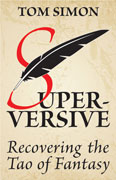Then Victoriana took a little toy harp and began. The noises of the toy harp were so strange that John could not think of them as music at all. Then, when she sang, he had a picture in his mind which was a little like the Island, but he saw at once that it was not the Island. And presently he saw people who looked rather like his father, and the Steward and old Mr. Halfways, dressed up as clowns and doing a stiff sort of dance. Then there was a columbine, and some sort of love-story. But suddenly the whole Island turned into an aspidistra in a pot and the song was over.
‘Priceless,’ said the Clevers.
‘I hope you like it,’ said Gus to John.
‘Well,’ began John doubtfully, for he hardly knew what to say: but he got no further, for at that moment he had a very great surprise. Victoriana had thrown her mask away and walked up to him and slapped him in the face twice, as hard as she could.
‘That’s right,’ said the Clevers, ‘Victoriana has courage. We may not all agree with you, Vikky dear, but we admire your courage.’
‘You may persecute me as much as you like,’ said Victoriana to John. ‘No doubt to see me thus with my back to the wall, wakes the hunting lust in you. You will always follow the cry of the majority. But I will fight to the end. So there,’ and she began to cry.
‘I am extremely sorry,’ said John. ‘But—’
‘And I know it was a good song,’ sobbed Victoriana, ‘because all great singers are persecuted in their lifetime – and I’m per-persecuted – and therefore I must be a great singer.’
—C. S. Lewis, The Pilgrim’s Regress
‘The Island’, in this particular allegory, is the particular experience, partly aesthetic and partly religious, that Lewis referred to elsewhere as ‘Joy’. If you want to inspire Joy in your audience, and you fail, I can heartily dis-recommend this method of dealing with it.









Recent Comments